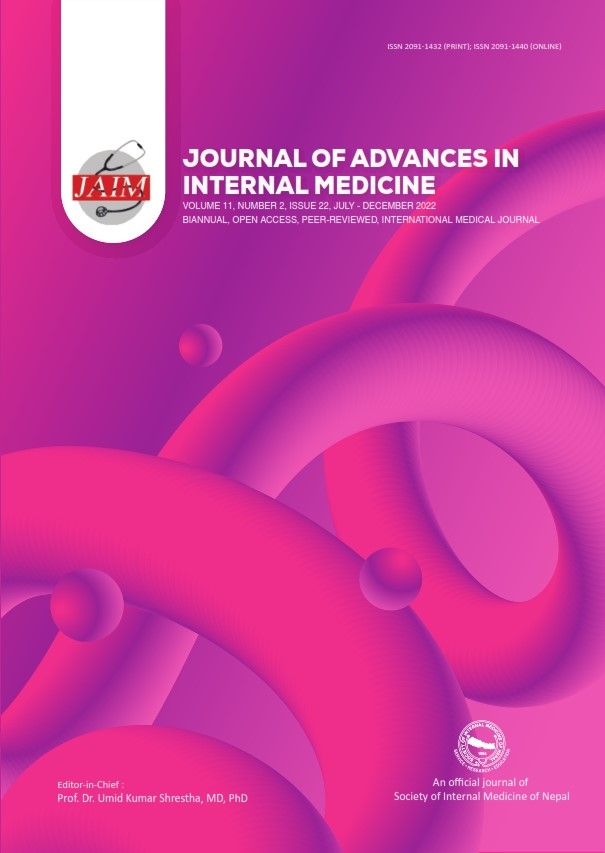Inflammatory Biomarkers in COVID-19: Associations with Clinical Characteristics and Outcomes among COVID 19 Patients Hospitalized in Sukraraj Tropical and Infectious Disease Hospital
DOI:
https://doi.org/10.3126/jaim.v11i2.52393Keywords:
COVID-19, Biomarkers, OutcomesAbstract
BACKGROUND Coronavirus disease (COVID-19) is an infectious disease caused by a newly discovered coronavirus referred to as SARS-CoV-2. Biomarkers has been linked with severity and appears to influence clinical outcomes among COVID-19 patients.
Aims: This study aimed to describe the association of inflammatory biomarkers with clinical characteristics, severity and outcomes among COVID 19 patients in a tertiary tropical and infectious disease hospital in Nepal.
METHODS This was a retrospective observational study where medical and lab records of COVID-19 inpatients (patients tested positive for SARS-CoV-2 via reverse transcriptase-polymerase chain reaction (RT-PCR)) admitted between April 2021 and September 2021 at Sukraraj Tropical and Infectious Disease Hospital, representing the second wave of COVID-19 were reviewed. Medical records of the patients were collected till discharge and inflammatory biomarkers were evaluated in relation to clinical presentations, severity and outcome among patients. Statistical analysis was done using SPSS 23.
RESULTS A total of 628 COVID-19 confirmed patients admitted in the study period were included in the study, 487 patients (77.5%) improved, 118 (18.8%) expired, and 23 (3.7%) were referred. Severity at presentation was significantly associated with Ferritin (p 0.013), CRP (<0.001), D-dimer levels (0.003) and Neutrophil-to-Lymphocyte ratio (NLR) (<0.001). Fever was found to have significant association with CRP (p<0.001) and ferritin (p 0.004), but not with D-dimer (p 0.587). Non-survivors were found to have significant association with higher ferritin (p <0.001), CRP (p<0.001), D-dimer (p <0.001) and NLR (<0.001). The duration of hospital stay was significantly affected by D-dimer (p 0.001) and CRP levels (p<0.001). Similarly need for mechanical ventilation had significant association with higher levels of Ferritin (p 0.002), CRP (p<0.001), D-dimer (p<0.001) and NLR (<0.001). Serial recordings of D-dimer showed increasing values had significant association with poor outcome (p<0.001).
CONCLUSION Higher values of D-dimer, ferritin, CRP and NLR were associated with higher severity of the COVID-19 disease and poor clinical outcomes including higher duration of hospital stay, higher need for mechanical ventilation and morbidity. Early stratification of disease based on biomarkers can guide early intervention to prevent bad outcomes.
Downloads
Downloads
Published
How to Cite
Issue
Section
License

This work is licensed under a Creative Commons Attribution 4.0 International License.
This license enables reusers to distribute, remix, adapt, and build upon the material in any medium or format, so long as attribution is given to the creator.




